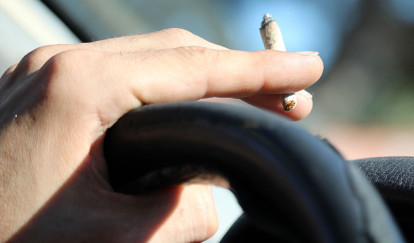
Share This Article
It is illegal to use or possess marijuana for any reason in the Commonwealth of Virginia, but newly appointed Gov. Ralph Northam pledged during his campaign to loosen restrictions. One of the major concerns with more forgiving marijuana laws is the increase in drivers getting behind the wheel while high―known as "driving while drugged."
How does marijuana affect the body and, more specifically, how does it affect driving ability? How do police test for marijuana in a driver they suspect of being impaired?
What Is Marijuana and How Do People Use It?
First, the basics. Marijuana―also known as pot, grass, weed, Mary Jane and hundreds of other nicknames―is a dry mixture of the cannabis sativa flower. It is commonly smoked in cigarette form, with a pipe, or with a water pipe called a bong. It can also be brewed in tea, mixed into food (most popularly, in brownies), or used with vaporizers. The main psychoactive chemical in marijuana is commonly referred to as THC; however, there are hundreds of other related chemicals in marijuana that can also have mind-altering affects.
How Does It Affect Driving Ability?
Because driving is so common and because many of us have been doing it for many years, we often forget that it requires a great deal of concentration and coordination to drive safely. It may not seem like it, but when you sit behind the wheel, your brain is working really hard to get you home in one piece. Anything that inhibits your brain's ability to be on full alert compromises your driving safety. Studies have shown that marijuana significantly impairs judgment, motor coordination and reaction time. This is due in part to THC, which affects the areas of the brain that control body movement, balance and memory.
Although studies about driving while drugged are not nearly as comprehensive as driving while drunk, research indicates that people tend to behave differently when driving drugged vs. driving drunk.
Drunk drivers tend to overestimate their skills: they drive too fast and make reckless choices. Stoned drivers are just the opposite: they tend to drive too slowly―which is often why they're pulled over―and try to overcompensate for their impairment.
While driving too slowly may not seem overly dangerous, drugged drivers also have difficulty handling multiple tasks at once or dealing with the unexpected. Yet, the unexpected happens all the time when we drive: a car cuts into your lane; a vehicle in front of you stops short; a pedestrian crosses outside of a designated crosswalk; a car drives in your blind spot. These situations are difficult enough to deal with while sober, but can be impossible while drugged. In fact, some estimate that driving while drugged increases the chances of a serious car accident by 100 percent.
How Do Police Test for Marijuana Use in Drivers?
When police suspect someone of drunk driving, they use a Breathalyzer or conduct a field sobriety test. The field test consists of following a pen with your eyes; walking a short distance in a straight line; and standing on one leg for 30 seconds. It is quite reliable, catching 88 percent of drunk drivers.
However, there's no field sobriety test for marijuana use. In fact, a drugged driver would likely have no problem with the test used for drunk drivers or even completing simple math problems. The only effective way to test for THC is with a blood test or urine sample, neither of which can be administered roadside. Marijuana can also remain in a user's system for days or even weeks after use, so even if a driver is not drugged, traces of THC may still linger in the blood.
Finally, and most worryingly, marijuana and alcohol are often used in tandem. If drivers are found to be under the influence of alcohol, police often won't test for drugs because the alcohol is enough for a criminal charge. When a driver is both drunk and drugged, it is also difficult to tell which had a more direct impact on driving ability; however, it is known that driving while drunk and drugged is much more dangerous than either alone.
If you have been injured at work or through the negligence of another individual or entity, contact us at (804) 999-9999 or or use the form below to connect with our legal team. We will fight to get you the justice you deserve.
